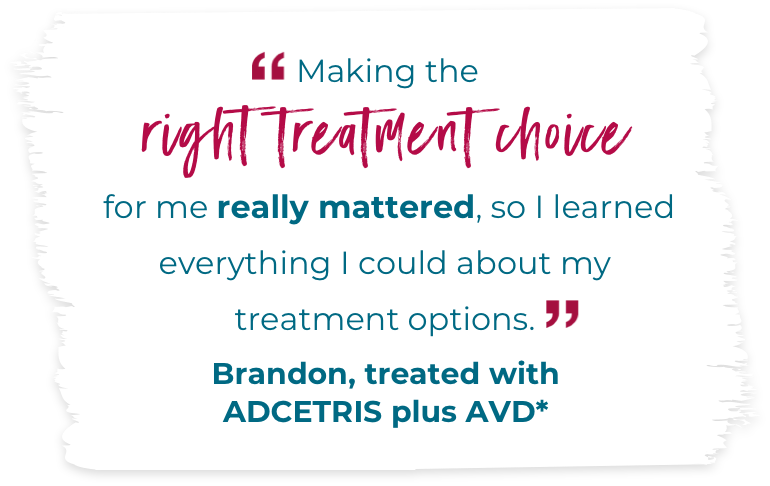With previously untreated Stage 3 or 4 Hodgkin lymphoma, first steps matter
Use the information below to familiarize yourself with important treatment considerations that can help you feel confident about the discussion and your treatment choice.
Learn more about what to consider when deciding on treatment, and see why ADCETRIS may be the right option for you.


*Brandon was compensated by Pfizer for participating in this campaign.
Use the information below to familiarize yourself with important treatment considerations that can help you feel confident about the discussion and your treatment choice.
Here are some things to consider:
Our Treatment Decision Guide can help
This downloadable guide helps answer these and other questions many new Hodgkin lymphoma patients have.
Use the guide to review the effectiveness of ADCETRIS, which aims to target a protein called CD30, plus AVD for previously untreated advanced stage Hodgkin lymphoma as compared to traditional ABVD chemotherapy.
DID YOU KNOW:
Up to 30% of people with previously untreated Stage 3 or 4 Hodgkin lymphoma relapsed or didn’t respond after treatment with ABVD (traditional chemotherapy)?

Reported in 2 medical journals: Lancet and New England Journal of Medicine.
Your voice matters when it comes to making a first-time treatment decision for Stage 3 or 4 classical Hodgkin lymphoma

If your doctor doesn’t mention ADCETRIS as an option, it’s OK to ask about it. Don’t hesitate to speak up and ask questions. Familiarize yourself with all available treatments and seek a second opinion if that will help you feel confident about your treatment choice. While your doctor is the expert regarding your diagnosis, you and your care team are equal partners in the treatment decision. Your perspective and concerns play an essential role in selecting a treatment that works for you.
ABVD: A combination of 4 chemotherapies—Adriamycin, bleomycin, vinblastine, and dacarbazine.
AVD: A combination of 3 chemotherapies—Adriamycin, vinblastine, and dacarbazine.
Consolidation treatment: Treatment that aims to kill any cancer cells that may be left in the body after initial treatment.
Relapse: When cancer has returned after a period of remission.
Remission: When signs and symptoms of cancer are reduced or undetectable.